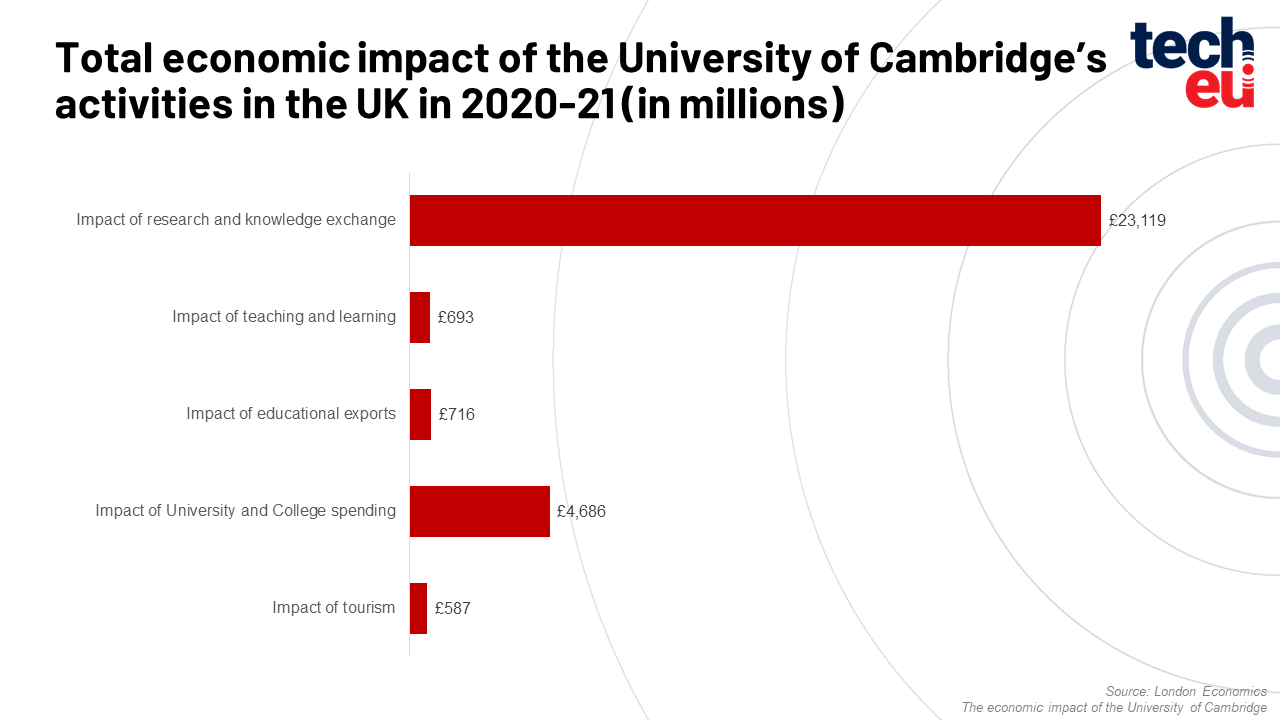When discussing learning outcomes and different contributions of various Universities, there is one very important aspect that needs to be analysed and taken into account when talking about the importance and quality of higher education – the economic contribution of the University to the overall economy of its home country.
Such research was conducted by London Economics, one of Europe's leading specialist economics and policy consultancies, on The Economic Impact of the University of Cambridge.
The tradition and initiatives concerning the promotion and strengthening of quality at higher education institutions confirm the social and cultural influence that Cambridge graduates and academics provide to the entire economic ecosystem of the UK. This impact is reflected through several different, but interconnected segments, including research and entrepreneurial activities, as well as the increased value and skills that arise as a result of a quality education system and the additional values which are reflected through the impact on the local, national, and global environments. This report presents a comprehensive attempt to estimate the economic value that the University of Cambridge brings to the UK economy.
According to the report, the University of Cambridge has a huge impact on the UK economy:
- The total net economic impact of the University of Cambridge on the UK economy is almost £30 billion per year.
- The University's contribution to the UK economy is almost four times greater than the contribution of the Premier League.
- The University supports more than 86,000 jobs across the UK.
- More than 78% of the economic impact is generated by companies that came out of or are closely related to the University, as well as research and commercial activities that are carried out at the University.
- The University of Cambridge is the most successful cluster and local ecosystem in the UK.
- More than 178 spinouts and 213 start-up companies are associated with the University, which represents the greatest influence of all universities in the UK.
- The success is the result of long-term strategic decisions that placed the University of Cambridge at the heart of one of the world's most successful innovation and technology clusters.
Of course, this influence did not arrive overnight, since 1209, the University of Cambridge has been fostering a culture of excellence, supported by the depth and breadth of study, research, and innovation that has driven the discovery of new knowledge and skills. The important aspect here is that there are capacities to convert knowledge and ideas into companies and organisations that change lives and create a strong ecosystem.
In the analysis of the overall economic impact of the University of Cambridge on the UK economy, several categories are included, namely:
- Impact of research and knowledge exchange (£23,119m)
- Impact of teaching and learning (£693m)
- Impact of educational exports (£716m)
- Impact of University and College spending (£4,686m)
- Impact of tourism (£587m)
So it is clear that the biggest impact, as could be expected, comes from the University’s research and knowledge exchange activities (£23.1 billion).

But let's see how much further the research defines these categories. Here, we will focus only on the first one, which represents the biggest economic contribution and which consists of two elements: research and knowledge exchange.
Thus, the report estimates that the total economic impact associated with the University’s research activities in 2020-2021 stands at approximately £5,000 million. This part includes the direct effects of the research, captured by the research income accrued by the University, net of any public funding but also productivity spillover effects from the University’s research activities.
Out of these, £339 million goes to direct research, and £4,661 million goes to the productivity spillovers associated with research. That means that for every £1 million of publicly funded research income, the University of Cambridge’s research activities generated an estimated total of £12.65 million in economic impact across the UK. That's not a bad ROI at all.
Furthermore, out of £23,119 million of the estimated economic impact of the research and knowledge exchange category, almost a quarter belongs to research. We can say that knowledge exchange has the greatest influence as one of the primary activities of the university.
Outcomes
The report included research on the economic impact of knowledge exchange activities, which includes the impact of spinout and startup companies associated with the University of Cambridge, but also wider knowledge exchange activities at the University.
These activities include contract research provided by the University, consultancy services provided by the University, the business and community courses provided by the University, facilities, and equipment hire and related activities, and licensing of University IP to other organizations.
Although this category is also quite broad, what perhaps interests us the most, given that Tech.eu covers the European tech ecosystem, is the first element, i.e. the economic impact of spinout and startup companies associated with the University of Cambridge. Let's see what we can find there.
The innovation landscape at the University of Cambridge
The nature of every science, and higher education institution in general, is to encourage learning, spread and share knowledge, stimulate innovative initiatives, apply acquired knowledge, etc., which all together create tangible benefits for society, but also enable and encourage the economic development of the country.
The University's tradition, and initiatives, and also a high level of quality of services and teaching, have contributed to the development of the first science park in the UK in 1970, the creation of a differentiated intellectual property policy in 2005, the establishment of Cambridge Enterprise seed funds, and the establishment of Cambridge Innovation Capital. And these are just some of the innovative initiatives that helped the University to become what it is today.
In order to create greater value for society, it is necessary to have the possibility to support the growth and commercialisation of ideas, which is possible, in the case of the University of Cambridge, through the support of Cambridge Enterprise and Cambridge Innovation Capital. When it comes to technology transfer, venture creation, consultancy services, and successful investment, these two companies are world leaders in these terms.
So, the University is at the heart of one of the world’s most successful innovation and technology clusters and contributes to its growth through people and ideas, spinouts and startups, capital investment, consultancy activity, and licensing of discoveries.
As stated in the report, as of 2022, the cluster has:
- 5,200 knowledge-intensive firms
- 71,200 people work in knowledge-intensive firms
- £19 billion in total annual turnover generated by knowledge-intensive firms
- $23 billion dollar business born in Cambridge
All these initiatives that combine innovation, enterprise, and commercialisation, were established with the same goal – to enhance the academic efforts for creating an innovative and better society, and to use all knowledge and resources to create a better environment, all started with the same initial force: innovation.
Spinout and startup companies within the University of Cambridge
As already mentioned earlier, the total direct, indirect, and induced economic impact of spinout and startup companies associated with the University of Cambridge is huge – £17,614 million across the UK economy, a justifiable figure considering the 178 University of Cambridge spinout companies and 213 startups that were active in 2020-21.
According to the report out of the 178 UK-based University of Cambridge spinout companies that were active in 2020-21, four spinout companies accounted for 94% of the total revenue of all University of Cambridge spinout companies (Solexa, human genome sequencing technology, acquired in early 2007 by Illumina; Cambridge Antibody Technology (CAT), phage display technology to drive the development of human monoclonal antibody therapeutics, acquired in 2006 by AstraZeneca and combined with its acquisition of MedImmume to form its global biologics R&D division); Xensource, enterprise-class virtual infrastructure solutions, acquired in 2007 by Citrix; and KuDOS Pharmaceuticals, a biotechnology company focused on oncology therapies, acquired in late 2005 by AstraZeneca).
Similarly, three University of Cambridge start-ups accounted for 83% of the total revenue of all the 213 start-ups (Abcam, a supplier of protein research tools to life scientists; Arm, a company that really needs no introduction; and Jagex, a game developer).
These seven spinout and start-up companies that were mentioned are huge success stories and primarily drive the results of this part of the analysis.
Other knowledge exchange activities that have an economic impact on the UK economy include licensing of University IP to other organisations, consultancy services provided by the University, contract research provided by the University, facilities and equipment hire, and related activities and the business and community courses provided by the University. These activities together amount to £504 million of estimated economic impact (or 2.8% of the total impact of knowledge exchange activity).

This is just a part of the comprehensive analyses of the economic impact of the University of Cambridge on the UK economy. And, as we saw, it does have a huge impact. What is encouraging in the whole ecosystem, when talking about the knowledge society and huge possibilities of knowledge exchange in today's environment is the fact that the majority of the economic impact associated with the University of Cambridge is derived from its research and knowledge exchange activities, with special emphasis on a significant number of highly successful spinout and startup companies associated with the University.
Knowledge exchange activities that are driven by individuals and companies with entrepreneurial drive and innovations that have a positive impact on the local, national, and global level create additional value to the education system as a whole, in this case, the University of Cambridge.
When saying that learning from practice is one way of gathering good knowledge, this example of the University of Cambridge supporting and enhancing research and knowledge exchange as well as the culture of a responsible approach to the education system, specifically when it comes to its impact on the overall economy, is one that can be learned from!
Lead Image: Tim Alex



Would you like to write the first comment?
Login to post comments